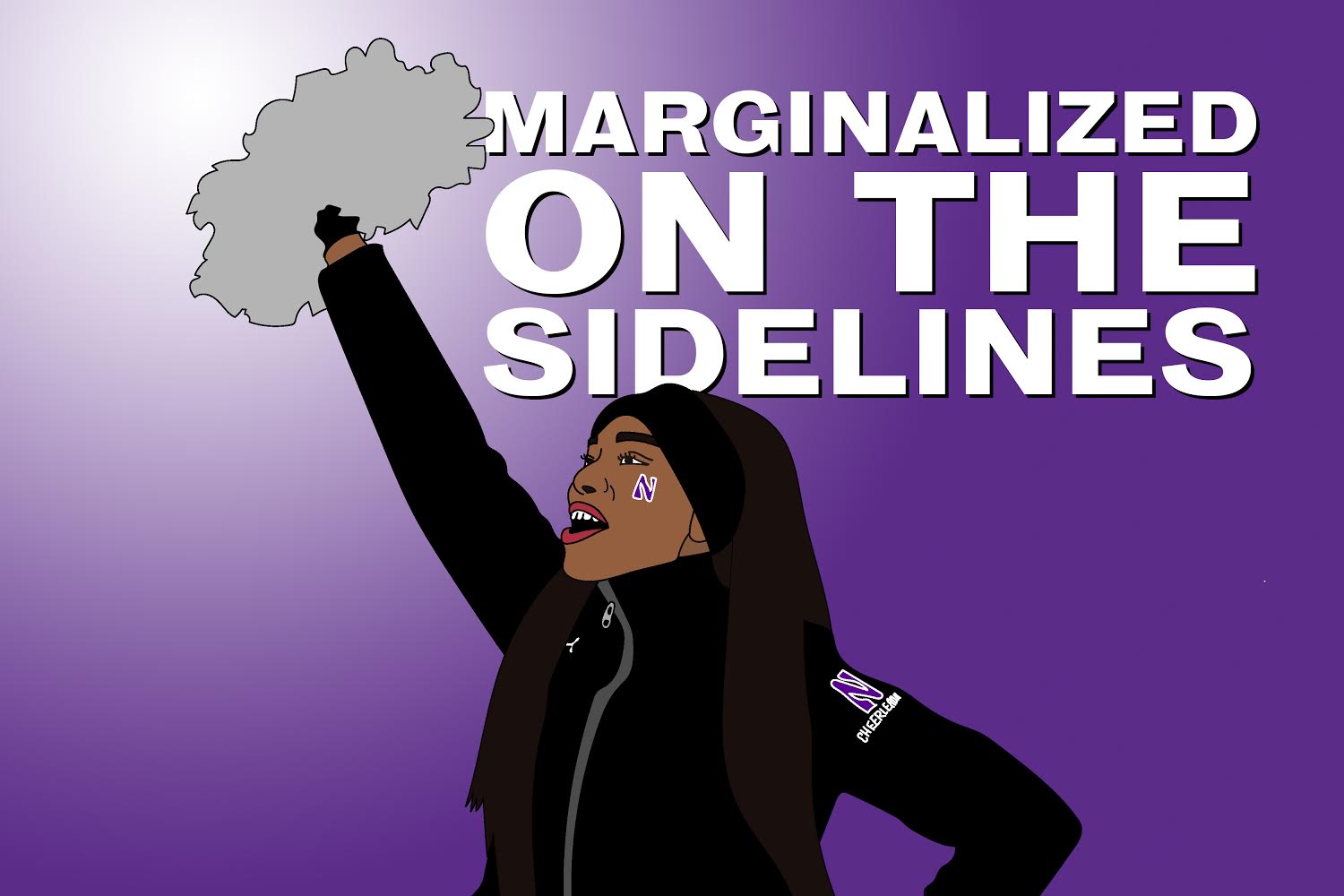In Focus: After the firing of Northwestern’s cheerleading coach, questions remain about the handling of racial discrimination within the program
February 4, 2021
Editor’s Note: Alyssa Johnson was a member of the Northwestern cheerleading program during the 2018-19 and 2019-20 seasons. She was contacted by the Office of Equity for their investigation on Pamela Bonnevier but did not participate.
Content Warning: This article includes mentions of physical harassment, racial discrimination and sexual assault.
Erika Carter (SESP ’18) never imagined she would sue her alma mater.
As a Black member of Northwestern’s cheer program from 2016 to 2018, she faced unequal treatment for wearing her natural hair, was forced to split up from other Black teammates on the sidelines for “optics” and was told in writing that ethnically Black hairstyles like braids were not allowed on the team. Now in her post-graduation years, she said she plans to take legal action for the racial discrimination she experienced.
“I have real effects, mentally and emotionally, from being on that team,” said Carter.
She received therapy from Northwestern’s Counseling and Psychological Services during her final year at the University to process the trauma of her experiences on the team. The suppression of her identity as a Black woman and the forced assimilation took a toll, she said — a sentiment others on the team echo.
Carter grew up around Northwestern, went to games as a child and saw her brother graduate from the school. Now, she is planning to file a lawsuit against the University in the near future — a decision that she said did not come lightly. Her attorney is writing the complaint now, to start the process.
A separate lawsuit filed Jan. 29 by a former cheerleader is alleging officials delayed investigations after she was groped and harassed by fans.
“No one wants to sue their undergraduate university,” Carter said. “But at the same time, it has hurt and taken so much away from me that I want to make that known. To me, it’s about Northwestern taking accountability for their actions.”
Carter is one of many women to detail racist behavior and abuse from former Northwestern cheer coach Pamela Bonnevier. Bonnevier was fired in Fall 2020, but interviews with current and former cheer team members indicate consistent negligence and cover-up from other University officials. The experiences Carter and her teammates voice raise questions about reporting processes and the handling of racism in the University’s athletic and marketing departments.
A quiet firing
Bonnevier worked at the University for the past decade as head coordinator of the Spirit Squad and as head coach of the cheerleading team. But on Nov. 2, after a 2020 investigation conducted by the University’s Office of Equity, Deputy Director of Athletics for External Affairs Mike Polisky informed the cheer team members that Bonnevier was fired, according to Weinberg junior Brielle Hampton, a current member of the team.
Northwestern did not make any announcement about the firing, and the specific findings of the investigation were not made available to the public. The former coach did not respond to multiple requests for comment.
The Spirit Squad consists of 21 cheerleaders and seven Willie the Wildcat mascots. It falls under both the marketing and athletics departments but athletics considers it neither a varsity nor a club sport, meaning the oversight of the team falls almost entirely to the coach. Their contract states that “Spirit Squad responsibilities should be second only to academics.”
Several cheerleaders said they were contacted by the Office of Equity early in the summer to share information on Bonnevier as witnesses in the investigation around reports involving discrimination, harassment and sexual misconduct.
Those who took part in the investigation recounted their experiences in Zoom meetings with Amanda DaSilva, deputy Title IX coordinator for students.
At the eventual Nov. 2 meeting, Polisky and athletic marketing official Heather Van Hoegarden Obering met over Zoom with the full team. Polisky went over a brief timeline with the exact dates of Bonnevier’s investigation and firing, then said the investigation had yielded that Bonnevier had to be terminated, according to Hampton.
Bonnevier, Polisky, DaSilva and Obering were all named as defendants in former cheerleader Hayden Richardson’s sexual harassment lawsuit against the University.
Carter first tried out for the cheer team in 2016 because she loved dance and sports, she said, and because she believed the team should be more racially diverse.
“I’m really big on representation,” Carter said. “To have the opportunity to represent Northwestern and say not only are there White girls that go here, there are also Black women — very beautiful Black women — that go to Northwestern as well.”
While she liked engaging with fans during game days, Carter said the discrimination she and her teammates experienced overshadowed the high points.
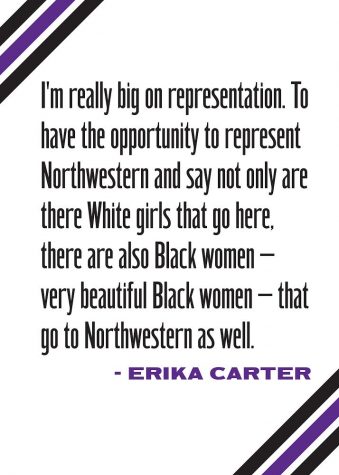 In an April 2017 email, Bonnevier told Carter wearing braids would impact her eligibility for post-season events and travel to away football games.
In an April 2017 email, Bonnevier told Carter wearing braids would impact her eligibility for post-season events and travel to away football games.
“You have to decide for yourself how (getting braids) fits into your needs/wants,” Bonnevier added in the email. “Just throwing this out there.. A wig for events could be an option for you.”
In her second season on the team, Carter said she felt she was given less prominence and fewer opportunities to travel to away games because she chose to wear her natural hair. Carter also said she and other Black cheerleaders were also told by Bonnevier they were not allowed to stand next to each other at games and events because of “optics.”
Carter said Bonnevier is not a lone actor, and that racial discrimination within the cheer program is rooted in broader systemic racism within the University. Until the 2019-20 football season, the program maintained a policy prohibiting cheerleaders from wearing “braids” on game days.
In the previous season’s contract, underneath the section that lays out the guidelines for “appearance,” the following is stated: “Team members will not have extreme high or low lights, extreme ombre color or braids … Hair and makeup must be worn in the assigned manner.”
“I think the contract is a very telling sign of just how deep the racism at Northwestern runs,” Carter said. “It wasn’t just Pam, it was even to the higher ups that were okay with discrimination, and with racism and with wanting Black girls to assimilate and wanting to have diversity, but not really wanting to have diversity.”
An all-American look
Bonnevier enforced these rules on appearance as soon as women walked through the door for their first practice on the team.
After Antoinette White (SESP ’20) tried out and made the team, she read through the contract they were all given and saw the “no braids” clause. When she went to her first practice with braids in her hair and turned in her contract, the coach asked her to change her hairstyle.
“I remember Pam saying, ‘Oh, you’re gonna get your braids out, right?’,” White said. “And that was the first instance where I knew that I would have to remove my Blackness.”
Similarly, Weinberg junior Jennifer Pius-Alonee tried out for the team in 2018 with braids in her hair. When she brought up the “no braids” clause with the coach, it was made clear the hairstyle she tried out in would not be acceptable.
“That really should have been a red flag,” said Pius-Alonee, who is a current member of the team.
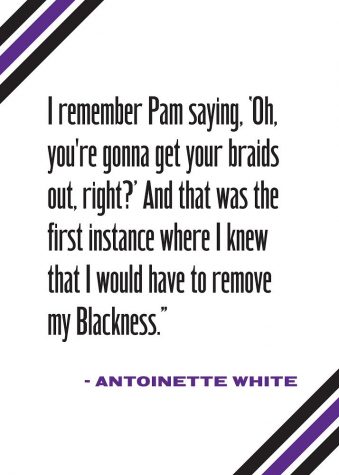 Not only did the old contract prohibit this ethnically Black hairstyle, Bonnevier also discouraged natural curly or kinky hair from being worn on game days, according to several team members. The contract’s language mentioned that “hair and makeup must be worn in the assigned manner,” a designated appearance that Bonnevier called the “all-American look,” Hampton said.
Not only did the old contract prohibit this ethnically Black hairstyle, Bonnevier also discouraged natural curly or kinky hair from being worn on game days, according to several team members. The contract’s language mentioned that “hair and makeup must be worn in the assigned manner,” a designated appearance that Bonnevier called the “all-American look,” Hampton said.
For this style, hair had to be straightened or wand curled so Bonnevier could get the team to appear “uniform” — if a cheerleader’s hair was naturally too curly for Bonnevier’s liking, Carter said they would be told to straighten it. Not only did failure to follow these guidelines impact travel eligibility to away games, but Carter said this was another coded way of forcing cheerleaders to assimilate.
“It was very specifically aimed at Black women,” Carter said, “Saying ‘We do not want you showing your Blackness on the sideline, like you need to be Black, but within these parameters, so you need to change all your stuff to look White.’”
Pius-Alonee said during her first year on the team, she began to have panic attacks on the mornings of game days because of the appearance requirements.
“There are certain teammates that, because they’re White, blonde and blue-eyed, you know right away, she’s their definition of the all-American look,” Pius-Alonee said. “(Bonnevier) tries to fit everyone else to that standard… I don’t fit really into this all-American look naturally or even ever.”
Leadership passes over harassment complaint
Communication senior Skyler Maeso said Bonnevier once grabbed her by the hair for showing up with it in its natural curly state during a 2017-18 season football game. Bonnevier threatened to bench her for the next game and called her hair “disrespectful” because it was not styled the way she wanted, according to Skyler Maeso.
Skyler Maeso said at the time, there were few Black women on the team. As a mixed-race person, she said she felt forced to either straighten her hair or style it with products that damaged her curls.
“She took a fistful and yanked it,” Skyler Maeso said. “She physically pulled my hair to the point where I went back. I remember just being stunned. I didn’t say anything. I was just like, ‘Yes, coach. I’m sorry, coach.’ That was the beginning of a game day. I was shaking, no one ever touched me like that before.”
Skyler Maeso’s mother, Alexandra Maeso, said she reported this incident to Polisky, who told her he couldn’t do anything unless her daughter talked to Bonnevier about the incident. She was told that if nothing changed at that point, her daughter would need to come directly to him about what had happened. Due to her fear that Bonnevier would further harass her, Skyler Maeso ultimately didn’t come forward.
Alexandra Maeso said Polisky should have reported the hair pulling to the Office of Equity or to the athletic department. No one contacted the Maesos about the incident, they said, and no repercussions or action appeared to be taken against Bonnevier in the 2017-18 season.
Employees are mandated to report any known incidents of harrassment or discrimination to the Office of Equity, according to an email from University spokesperson Jon Yates.
“All University employees with supervisory or managerial authority … are obligated to promptly report incidents of discrimination and harassment of which they become aware in the scope of their work for the University to the Office of Equity,” the email said.
Yates also told The Daily he would be speaking on behalf of Polisky, Obering and outgoing Athletic Director Jim Phillips and that they would not be available for interviews.
Skyler Maeso called her first season on the team a “hellish” year because of the way Bonnevier criticized her appearance. She remained silent about the harassment because she feared Bonnevier and felt shame.
“I didn’t tell my friends at school,” Skyler Maeso said. “My roommate didn’t know my freshman year. I’d come home from practice in tears and just do a lap around the dorm. I didn’t want anyone to know. I was ashamed and I don’t know why.”
For her second season, Skyler Maeso said she wore a wig during game days to appease Bonnevier and stop the harassment. Then, she was chosen to travel to away games and alumni events.
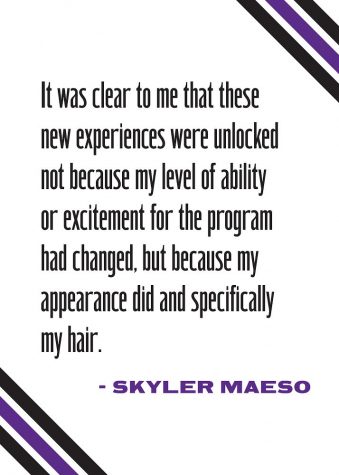 “It was clear to me that these new experiences were unlocked not because my level of ability or excitement for the program had changed, but because my appearance did and specifically my hair,” Skyler Maeso said.
“It was clear to me that these new experiences were unlocked not because my level of ability or excitement for the program had changed, but because my appearance did and specifically my hair,” Skyler Maeso said.
“You’re a strong girl”
According to multiple team members, cheer program leadership downplayed the health or safety concerns of the Black women. Bonnevier expected Black cheerleaders to continue stunting through any pain – an expectation that did not extend to their white teammates, Hampton said.
Hampton said she joined the team right after she experienced an ACL injury. While she had been doing physical therapy the entire summer, cheer practice was the first time she worked her knee since the injury, and her concerns about her physical health often went ignored by Bonnevier.
She shared that during a preseason practice, when she told Bonnevier her knee was in pain, the coach responded by making her sit out in an attempt to punish her. The coach later apologized and allowed Hampton to rejoin the practice. Hampton also said during that same preseason, Bonnevier once told a White teammate with a similar knee injury she didn’t need to do a shoulder stand, but expected Hampton to do one. Hampton also faced issues with an athletic trainer.
“To a lot of people, Black women are just deemed really strong and can get through anything,” Hampton said. “I needed someone who was qualified to tell me what I needed to do to feel better, I need to do exercises, but (my athletic trainer) literally was just like, ‘You’re a strong girl.’”
Pius-Alonee said Black cheerleaders on the team were expected to be “superhuman,” recalling an incident her first year during a preseason practice. She told Bonnevier her shoulder hurt when another teammate stood on it, and asked to stop the stunt for her and her teammate’s safety.
She said Bonnevier ridiculed and humiliated her, claiming that Pius-Alonee needed to “work out” more. At the same practice, a White teammate who said her back was in pain was told she could stop. Pius-Alonee had to keep going, which led to her shoulder injury worsening later in the season.
Grounded and separated
Black women on the team also said Bonnevier gave preferential treatment to White teammates who were working toward being flyers over Black teammates.
Carter said from 2016 to 2018, capable Black flyers were not given the chance to be in the air during routines, and Bonnevier often came up with excuses to put them on the bottom of formations.
Black women were expected to showcase diversity but weren’t given value, Carter said.
“It just has so many notions of like, ‘Let’s raise White women up and let’s have White women be the face and the poster children of Northwestern while we just have Black girls, just put them in there just so we can say it’s somewhat diverse,’” Carter said.
Weinberg senior Stevie Askew said during her first year on the team in 2019, Bonnevier placed unfair expectations for stunting on her as the only Black flyer. Bonnevier gave her less practice time in the air compared to White flyers, Askew said.
“I was pretty much just left out to dry,” Askew said. “When I did something good, it was like she was never there to see it. She was deliberately not coming to see it.”
During the same season, Hampton said, one White flyer with no cheer experience was put in the air over Askew, despite several team members expressing concerns regarding safety. However, in the 2017-18 season, a talented Black flyer was denied the opportunity to fly by Bonnevier, who pointed to her lack of cheer experience, according to Carter.
Hampton said she felt Bonnevier prioritized having White cheerleaders in the air for the “optics” of the team.
“She does not think we’re worthy of being in the air,” Hampton said. “Stevie flew in high school. She has the most experience flying. Why are you trying to put her on the ground?”
Outside of stunting and appearance expectations, White said Bonnevier would tell her to “split up” from her Black teammates on the sidelines, but never asked her White teammates to move away from their friends. Bonnevier would claim she didn’t want the crowd to think the team was being discriminatory toward Black cheerleaders, White said.
White reflected on why it took years for these incidents to be brought up to administration.
“Nobody has said anything,” White said, “Because they probably had the same idea that I had, which was, ‘It’s not my place to speak up. This is just how things are. This is how things work.’ Who am I to speak up against someone who is (in) power? And if I do, what kind of retaliation will I face because of it?”
Breaking their silence
In the winter of 2019, teammates banded together and decided to come forward. Cheerleaders, past and present, wrote anonymous letters to Obering and Polisky alleging Bonnevier’s abusive and racist practices.
The program does not have an evaluation system set up with the athletic department like other sports teams at Northwestern. At the time, if members wished to give feedback about the program, they were told to set up a meeting with Bonnevier.
The letters recounted instances of racial discrimination, lack of safety precautions at practices and negligence towards reporting and dealing with injuries, as well as feelings of unsafety at tailgates and other events due to sexual harassment from fans and donors.
After the letters were sent, White and Richardson met with Obering and Polisky to discuss the allegations.
White describes the January 2019 meeting with Polisky and Obering about these letters as frustrating. She said Polisky “defended” Bonnevier, and didn’t take the allegations of racial discrimination seriously or understand where the Black women were coming from.
“He framed the whole situation as if we were trying to just attack (Bonnevier) because she’s a mean coach,” White said. “Right away, Mike’s not really feeling the whole firing (Bonnevier) thing.”
After the January meeting and a follow-up meeting that included DaSilva, the Office of Equity did not bring in any teammates for questioning and Bonnevier was not fired. The coach then received an “under-the-radar, informal ‘educational training,’” according to Richardson’s lawsuit, but it is unclear what the training covered.
Letter response falls short
In the following cheer season, the program ended appearances at tailgates, implemented new safety measures like prohibiting stud earrings at games and established a “student-selected Leadership Council” to communicate issues to department administration. The contract was also updated, removing the “no braids” clause and the rest of the appearance portion.
Many teammates described the administration’s response as disappointing, and said more should have been done in response to the letters.
While the “no braids” clause was removed, Pius-Alonee said Obering or Polisky should have made a statement to acknowledge the racism within the contract and to apologize on behalf of the athletic department. In her opinion, officials mistakenly believed eliminating this part of the contract would end racism in the program. But Pius-Alonee said removing the clause was not enough to prevent an environment of racial discrimination from continuing, and the response did not reflect the severity of the letters.
“These are graphic, like people are describing what happened to them in detail,” Pius-Alonee said. “There are so many letters that were submitted, and senior leadership just decided to come to a practice, announce that they changed the contract and call it a day. No apology, no nothing.”
According to Pius-Alonee, the measures were so poorly implemented that one of her White teammates told her she didn’t understand what had changed.
“The braids issue was addressed as if that rule was outdated, rather than it being racist,” Hampton said. “Those words, like ‘racism,’ were just never brought up at all. There was no apology for it from the coach or from the head of marketing. It was literally just swept under the rug.”
According to White, while officials made it clear they wouldn’t fire Bonnevier, they didn’t even tell the team members if she would receive any punishment or be required to do diversity training.
White detailed how during the 2019-20 season, with Bonnevier still coaching, the issue of racial discrimination persisted. She said Bonnevier made a remark to a White teammate with a spray tan that “by the end of the game, you’re gonna look like (Hampton).” White brought up the incident with Bonnevier a few months later and had to explain to her why the comment was unacceptable and discriminatory. She said Bonnevier then sent an apology message to Hampton.
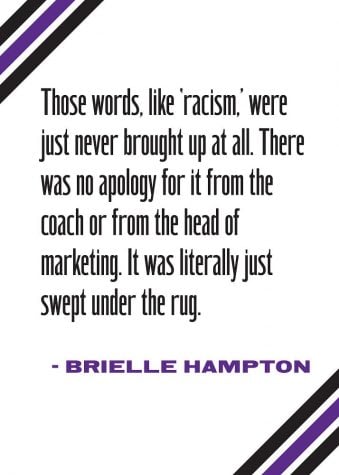 “Why is there no compass?” White said. “Why is there no drive to want to know more? So why is there no repercussions, there are no extra steps that you’re taking to educate yourself more about people that you’re supposed to be a role model to. There’s no push by the administration for you to do that.”
“Why is there no compass?” White said. “Why is there no drive to want to know more? So why is there no repercussions, there are no extra steps that you’re taking to educate yourself more about people that you’re supposed to be a role model to. There’s no push by the administration for you to do that.”
After the letters and allegations in 2019, Hampton said Phillips, then the athletics director, appeared at one practice but did not directly mention the letters. To this day, she has no idea to what extent Phillips knew about the situation. His speech at the practice, where he said he “appreciated” the teammates, made Hampton feel like the athletic department thought the cheerleaders were being “whiny.” Ultimately, she said, the team was “just asking for the bare minimum.”
White said she thinks Phillips’ lack of involvement in the situation was due to the low priority the athletic department places on the cheer program.
“No one’s advocating for you,” Pius-Alonee said. “It just tainted the experience, honestly. The only thing that kept myself and most people around was the fact that we leaned on each other to support each other.”
An uncertain future
The 2019-20 cheer season was cut short due to COVID-19. Then, in June 2020, the Office of Equity called on current and past cheerleaders for questioning for a formal investigation. It is unclear what prompted this investigation, which was conducted a year and a half after the letters were received.
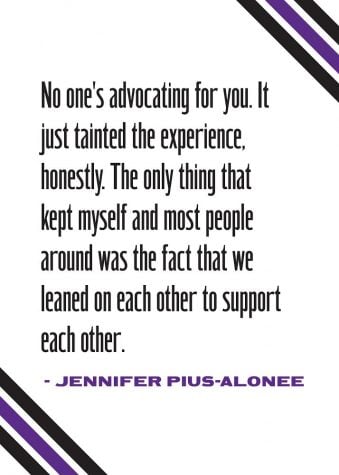 As the program remains inactive during the pandemic, it is unclear if there are plans to hire a new coach, or who makes up the team’s current leadership. If the department moves forward with finding a new coach and restarting the program, they will have to grapple with Richardson’s published lawsuit and Carter’s forthcoming one, the ongoing pandemic and the departure of Phillips.
As the program remains inactive during the pandemic, it is unclear if there are plans to hire a new coach, or who makes up the team’s current leadership. If the department moves forward with finding a new coach and restarting the program, they will have to grapple with Richardson’s published lawsuit and Carter’s forthcoming one, the ongoing pandemic and the departure of Phillips.
Several cheerleaders share a hope that whatever the future of the program is, it can become a supportive environment –– not just from teammate to teammate, but from the coach and administration.
“I made really great friends on the team,” Hampton said. “We hung out outside of practice. My teammates were the only thing that made practice somewhat enjoyable. I think that was the reason I stayed.”
Even with the firing of Bonnevier, Pius-Alonee said racial discrimination will remain because the program is a byproduct of an overall racist system. She said she and her Black teammates’ experiences reflect a broader institutional inability by Northwestern’s administration to address issues Black students face. She pointed to the administration’s response to NU Community Not Cops as an example.
“How things were addressed… magnified the pain that me and my teammates went through,” Pius-Alonee said. “Everyone needs to wake up. There are certain things that happen at this University that should not be normalized.”
Email: alyssajohnson2021@u.northwestern.edu
Twitter: @amichelej
Related Stories:
— NU cheerleader sues University for allegedly ignoring sexual harassment
— Q&A: Cheerleaders speak out about confusion, lack of communication amid tumultuous Big Ten restart

